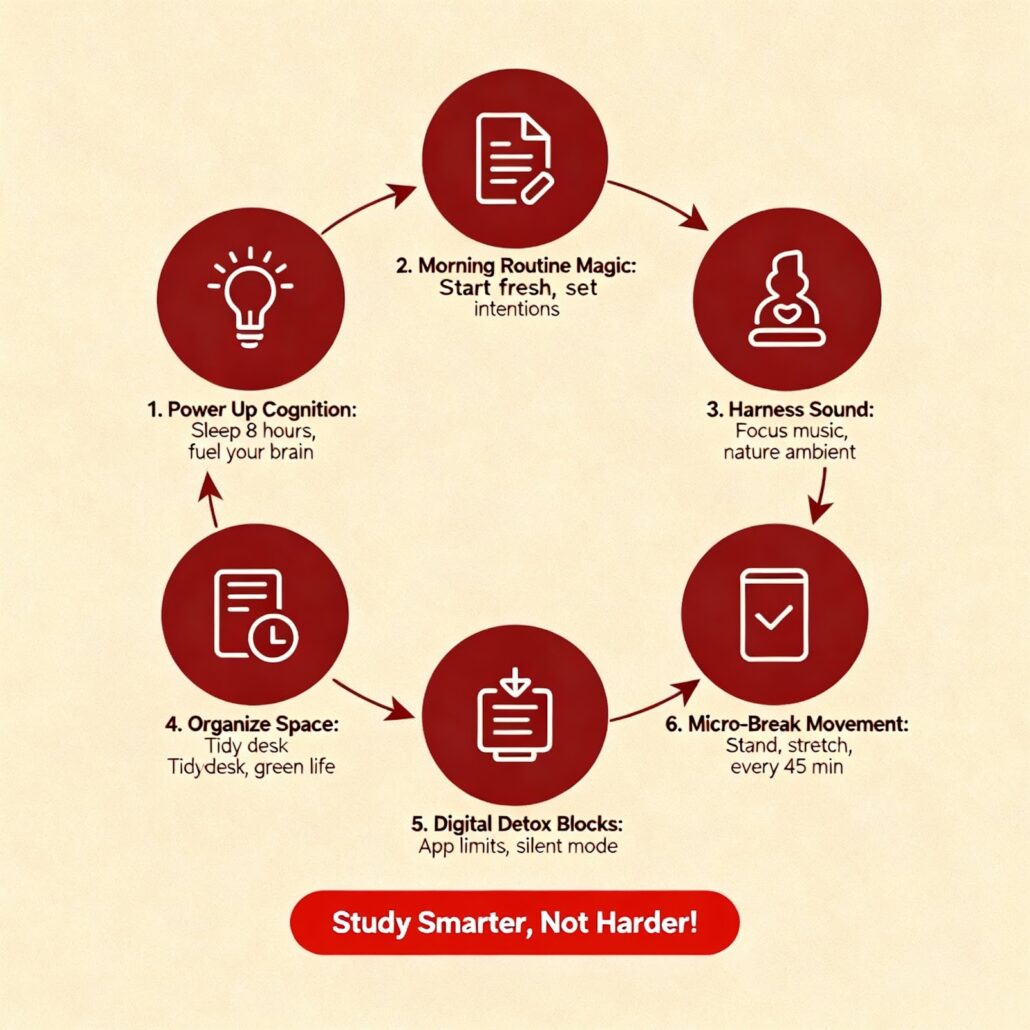Every student has that moment when the mind just refuses to cooperate, the page looks familiar, but nothing sticks. The eyes move across the text, yet the thoughts wander elsewhere. At that point, the real challenge isn’t what’s written in your books but it’s figuring out how to improve concentration and focus while studying for long hours without losing your mental energy.
Concentration isn’t something one can switch on instantly. It’s like a habit built slowly, shaped by your routine, and strengthened by how you treat your mind and body.
Table of Contents
ToggleScience Behind Concentration and Memory
Before learning how to improve concentration and focus while studying, it’s important to understand what’s really happening inside your brain. Understanding the reason behind will help you recognize patterns, and get a clear picture in improving your concentration and memory while studying.

Your prefrontal cortex, the area right behind your forehead controls focus and decision making.
It can handle deep focus for about 40-60 minutes at a time before attention starts fading.
The more overload your brain feels, the more easily it gets distracted.
The secret isn’t studying endlessly, it’s about creating a rhythm that allows focus to flow naturally.
These aren’t just facts, this is the real science behind how our brain works and how to keep it going for long hours (usually for study or work). By understanding the science behind the brain, you can regulate your brain with ease and understand how to train it accordingly.
Think of your brain like a camera lens, it sharpens best when it’s clean, calm, and focused on one subject at a time.
Handy Tips to Improve Concentration and Focus While Studying For Long Hours
1. Set Clear, Short-Term Goals
One of the smartest ways to build focus is to make your brain feel like it’s winning small battles.
Here’s how to do it naturally: Replace extreme plans with specific ones. Instead of “I’ll study Physics,” say, “I’ll complete the first two derivations from Thermodynamics.” Every completed mini goal gives a dopamine boost, which acts as a natural motivator. Psychologists call this the Goal Gradient Effect, when you sense progress, your brain automatically sharpens its focus.
Try this: Write your mini goals on sticky notes. Ticking them off gives a genuine sense of accomplishment, like a little treat of something that your brain loves.

2. Make Your Study Space Your Focus Zone
The space you study in silently controls how your brain performs. Simple sensory tips and changes can help you naturally improve concentration: Keep only what you need on your desk. Clutter silently drains attention. Study under warm, steady lighting, it keeps your mind alert and eyes relaxed. Add a touch of calm: think of a plant, a subtle fragrance, or neat stack of notebooks. Avoid music with lyrics instead , play soft instrumental or nature sounds to maintain rhythm.
Fun Fact: A clean environment reduced mental fatigue by up to 25%, according to cognitive psychology studies.
3. Using Pomodoro Technique for Time Management
The Pomodoro technique is an excellent time management method for improving focus for long-term study hours. For example, you can set a timer for 25 minutes to study with undivided attention, free from phones and distractions. After this, you can take a 5-minute break to refresh your mind.
After completion of 4 such cycles, you can take a longer break of 20–30 minutes to recharge fully. This method will always keep you on track by ensuring consistent productivity throughout your study session.
Tip: You can use a physical timer (for example, an hourglass) to avoid digital distractions and stay committed to each cycle.
4. Train Your Memory Like a Muscle
Memorization isn’t about reading more, it’s about recalling better. To improve memory and concentration, make your brain work to remember instead of just passively reading.
Try these scientific tricks : Use active recall, close your notes and explain a concept in your own words. Apply spaced repetition, revise after 1 day, 3 days, and a week. Mix Subjects : Studying different topics helps the brain form diverse neural links. It keeps your brain sharp and intellectually stimulated. Summarize what you study in short notes or mind maps.
Remember: The struggle to recall something strengthens your memory far more than re-reading the same line ten times.
5. Feed Your Brain, Not Just Body
Your diet quietly decides how long your focus lasts. A hungry or heavy brain cannot think sharply. Try Including foods that naturally support how to improve concentration and focus while studying (if you can):
- Nuts and Seeds: Packed with omega-3s that support brain function.
- Blueberries: Known for improving memory and alertness.
- Dark Chocolate : Boosts serotonin and focus when taken in moderation.
- Leafy greens and eggs: It helps to maintain mental energy and clarity.
- Plenty of water: Even slight dehydration can make you drowsy and distracted.
Quick rule: Eat light, eat often and drink water, your brain performs well when your energy levels are balanced.
6. Games To Improve Concentration
Sometimes, the best way to train focus is to make it fun. A few simple games to improve concentration can make a real difference:
- Chess: Builds patience and long term strategic thinking.
- Sudoku & Crosswords: This one improves logic and pattern recognition.
- Memory cards or Matching puzzles: These help with Strengthen short term recall.
- Apps like Lumosity or Peak: Offer short, scientific brain workouts.
Pro tip: Try limiting play time to 15 minutes a day, it should refresh your brain, and not replace study time.
7. Yoga and Meditation: The Mind’s Reset Button
When the mind is restless, focus naturally becomes impossible. That’s where yoga for memory improvement and concentration comes in. Simple techniques that actually work:
- Pranayama (breathing exercise) : Pranayama increases oxygen flow, and calms your brain instantly.
- Padma Sana and Vajrasana : This helps in balancing energy, and regain focus.
- Meditation for 10 minutes daily : Meditation improves attention span if done regularly. It also promotes spiritual health.
- Body stretches between study sessions : Regular body stretches during long sitting hours prevents fatigue and keeps energy levels steady.
Plus point: Even one minute of deep breathing can reset your attention if your mind starts wandering.
8. Guard Your Mind from Digital Noise
If there’s one thing modern students battle daily, it’s a distraction from devices. To protect your focus, Turn on Focus Mode or “Do Not Disturb.” Keep your phone physically away while studying. Use apps like Forest or Freedom to block social media temporarily. Check notifications only after you finish your study cycles.
Important information: Each notification can delay your refocus by up to 20 minutes. That’s almost half an hour of lost mental energy.
9. Rest Well
When you sleep, your brain isn’t resting, it’s organizing, filing and strengthening memories. To improve concentration and focus while studying, give your mind proper rest. Sleep for at least 7 to 8 hours consistently. Avoid screens at least an hour before bedtime. A nap for 20 to 30 minutes is needed as short naps boosts mental productivity. Don’t study lying down, as it will do nothing but make you extra lazy.
10.Small Psychological Tips That Works Wonders
Sometimes the smartest solutions are invisible, the tiny shifts that help the brain refocus naturally. Try these practical hacks and trust me you’ll love it :
- Visualize your own success by picturing yourself calmly completing your study plan.
- Treat yourself after completing a tough topic.
- A new space can refresh mental clarity.
- Focus on “positive self talk”, replace “I can’t focus” with “I’ll focus for 20 more minutes.”
- One minute of deep breathing can reset focus instantly.
Remember: Motivation gets you started, but self discipline keeps you consistently going.
11. How To Improve Child Concentration Naturally
Helping a child learn how to improve child concentration doesn’t require long lectures, it needs small, engaging habits. Parents can try these approaches, use games and story telling to teach. Children focus better when learning feels playful. Keep study sessions short (20-30 minutes). Maintain a routine as same study time builds mental readiness. Encourage outdoor activities as movement improves attention. Praise efforts more than results, it builds inner focus.
Tip: Gentle consistency works better than pressure. Children learn to focus when they feel calm and supported.
12. Practice the Art of Refocusing
You’ll have off days, everyone does, but what truly matters is how quickly you bring your focus back.
- Don’t get frustrated when your mind drifts, just notice and return.
- Train awareness through mindfulness, even 5 minutes daily will help.
- Each time you refocus, you strengthen your mental “attention muscle”.
- Focus is not about never getting distracted, it’s about recovering faster every time you do.
Final Thoughts
Learning how to improve concentration and focus while studying isn’t about forcing yourself to sit for hours. It’s about aligning your habits with how your brain naturally functions.
- Eat and rest well.
- Keep your space peaceful.
- Train your mind gently, not harshly.
- Celebrate progress, not perfection.
- And remember, even small daily efforts build unshakable concentration over time.
Celebrate the progress, not the perfection. We’ve noticed that many students discover this balance once they are part of a guided, disciplined environment, just like the one we strive to create at Matrix Institute, where we help you to grow your focus naturally through the right mindset and mentoring. Once you find your rhythm, studying long hours stops feeling like survival, it becomes a steady flow of clarity and confidence.







![Allen Sikar- Allen Career Institute [Updated]](https://www.sikareducationhub.in/wp-content/uploads/2021/06/Sikar-Education-Hub-42_converted.webp)



